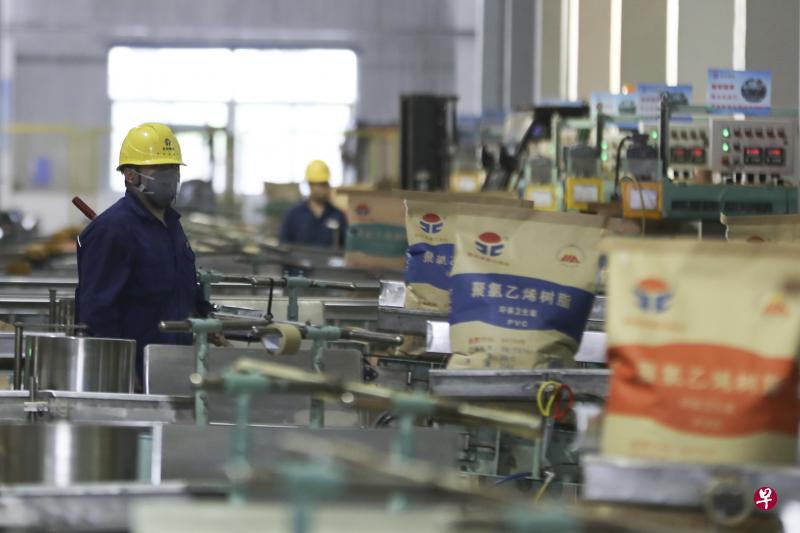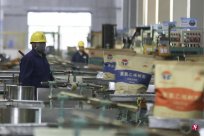
Zhao Qinghe, senior statistician of the National Bureau of Statistics, pointed out that the Chinese economy faced with adverse factors such as epidemic and high temperature in August, the production index of manufacturing PMI production index and the new order indexThe continued contraction of the items indicates that the recovery of manufacturing production and demand still needs to be strengthened.
China ’s manufacturing activity in August continues to be lower than 50 points of Rongku, and shrinking for the second month in a row means, which means that the drought limit of Sichuan and Chongqing has caused the suspension of production, the real estate market crisis, and the overlay of the epidemic.Macroeconomic stall risk.
The analysts of the interviewed expectations expect that as the drought crisis has gradually been lifted in the near future, the Chinese manufacturing industry may soon usher in a steady rebound.After the system is more stable and the zero -zero policy adjustment, the pace of recovery is expected to speed up in the fourth quarter.
China National Bureau of Statistics announced on Wednesday (August 31) that China ’s manufacturing procurement manager index (PMI) in August was 49.4, which was 0.4 points slightly higher than July.However, it is still less than 50 points of honor, which means that the advance indicators that measure the prospects of the industry have shrunk for two consecutive months, and reveal the weak momentum.
Non -manufacturing PMI expansion momentum also slowed significantly in August, from 53.8 in July to 52.6, a decrease of 1.2 points.
Zhao Qinghe, a senior statistician of the National Bureau of Statistics, pointed out that the Chinese economy faced with unfavorable factors such as epidemic and high temperature in August, and the two subdivisions of the manufacturing PMI production index and the new order index continued to shrink, indicating that the manufacturing production production industry productionThe recovery of demand still needs to be strengthened.
Affected by the disadvantaged news, mainland China and the Hong Kong stock market fell on Wednesday early on Wednesday. Among them, the Shanghai Composite Index and the Hang Seng Index fell 1.2 % and 0.4 %, respectively.
Bloomberg Economist Shu Chang and other interpretations. In August, China's PMI confirmed the signal issued by high -frequency data, that is, the Chinese economy continued to slow down during the summer.In addition to the pressure brought by the decline in real estate, the multiple shocks from the outbreak of the epidemic to the shortage of electricity have also caused the economy.
Economic Research Corporation, Kaitou Macroeconomic Economist Evans Poricad, also pointed out that the officially announced PMI shows that the economic momentum in August has further weakened, and it is expected that the economy will make great progress in the next few months.
The Chinese economy is facing multiple pressures this year. Not only does the real estate market continue to downturn, but the scope of the rebound of the epidemic has also reached the most, which affects 31 provinces and cities in the mainland.According to Evans Porgrhide's estimation, 41 cities in the mainland are currently exploding outbreaks, and the total economic volume accounts for 32 % of GDP (GDP), which is the highest since it was widely blocked in April this year.
The most severe drought since 1961 in Sichuan and Chongqing, China, has led to a sharp decrease in local hydropower. In mid -August, the two places announced the 11 -day industrial power limit period. Some factories were forced to suspend production.Create the pace of China's economic recovery.
Sichuan announced last week that as the temperature began to decline and hydropower improvement, the phenomenon of power -off will be alleviated.
Xie Dongming, director of the Research Director of the Greater China of Singapore Overseas Chinese Bank, analyzed in an interview with Lianhe Zaobao. With the termination of extreme high temperatures, China will also face the cautious emotions in the real estate market in September, and the dual uncertain factors for the continuous clearing policy."If these emotions have not improved significantly, they may bring some pressure on the entire PMI and manufacturing (continue)."
Yang Yuting, an economist of Australia and New Banking Group, expects that before the 20th National Congress of the Communist Party of China was held in October, the official may further tighten the epidemic prevention measures and bring interference to economic activities.
Xie Dongming believes that China should not have the extreme situation similar to Shanghai's sealing city in April this year. The impact of the future epidemic on the economy "may not be as great as in the second quarter."However, he also expects that the possibility of adjusting the zero -zero policy before the 20th National Congress, strict implementation of dynamic clearing zero will inevitably affect the speed of China's economic restoration.
Xie Dongming also said that although the Chinese government has introduced a considerable economic stimulus policy, the implementation of the place in the short term still faces greater challenges.He believes that as the entire political system tends to stabilize after the 20th National Congress, the efficiency of implementation policies will also be improved. After the fourth quarter, a clearer economic recovery may occur.
(Reporter is a special agent in Chongqing in the Morning Post)


